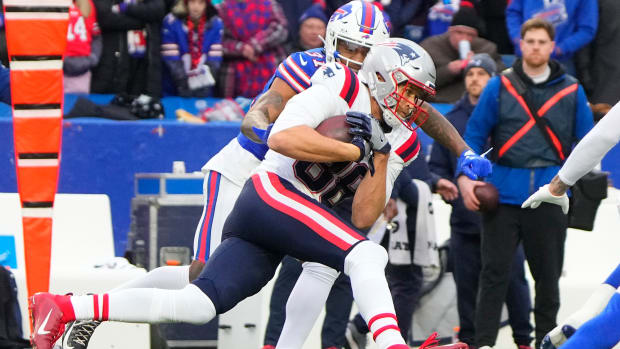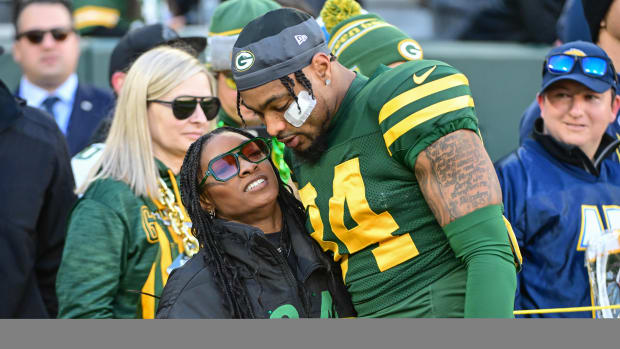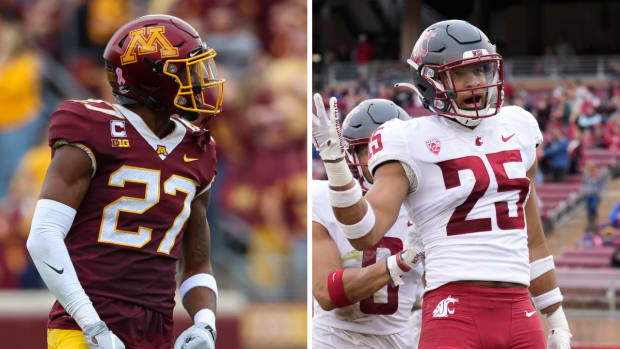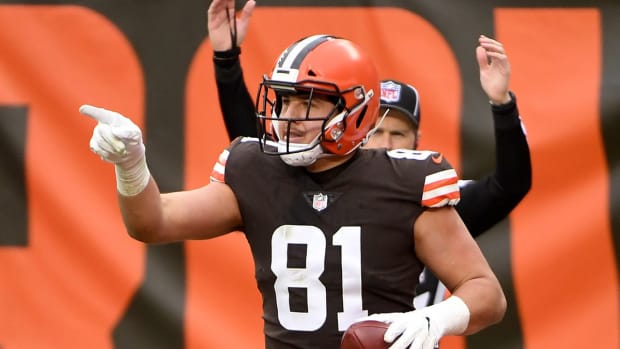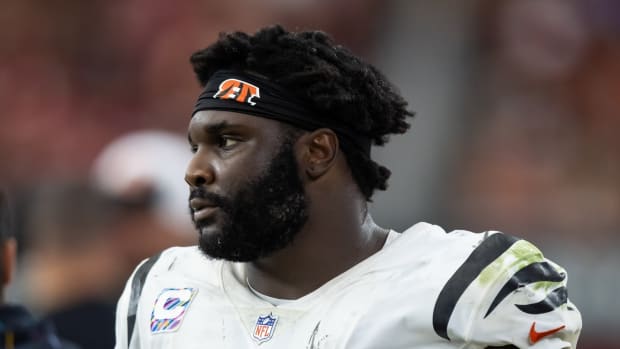Brett Favre–Backed Drug Companies Tied Into Welfare Fraud Scheme, per Report
Another bombshell report regarding Brett Favre’s involvement in an ongoing welfare fraud investigation was published Tuesday, stating that two concussion drug companies that Favre backed had “overstated their NFL connections and exaggerated the known effectiveness of their drugs during efforts to raise money,” according to documents obtained by ESPN.
The companies, Prevacus and PresolMD, and their founder, Jake VanLandingham, received more than $2.1 million in state welfare funds from the Mississippi government, a civil lawsuit alleges.
VanLandingham also was discovered to have substantial debts over the past few years.
“I had no idea this was welfare money, and I’ve always been an upstanding person when it comes to research,” VanLandingham told ESPN.
Favre has yet to comment on this new development in the welfare fraud case, although he previously has stated that he invested $1 million of his own money into the companies.
Favre is one of dozens of individuals being sued by the state of Mississippi for misappropriating welfare funds. Text messages obtained by Anna Wolfe of Mississippi Today show Favre, former Mississippi Governor Phil Bryant, nonprofit founder Nancy New and former welfare agency director John Davis worked together to funnel at least $5 million of the state’s welfare funds toward construction of a volleyball stadium at the University of Southern Mississippi, Favre’s alma mater. Favre’s daughter also played volleyball at the school.
Favre and VanLandingham have not been formally charged, but their names are included along with 36 others in the civil suit that seeks to recover $20 million for the state. Favre also reportedly has repaid $1.1 million in state welfare funds he received for speeches and appearances. He said he wasn’t aware the money came from welfare funding.
The two companies were working to develop a nasal spray to help treat concussions, along with a cream to prevent or limit concussions. Although VanLandingham and Favre promoted the drugs on various television and radio appearances, it was discovered that no actual research had been conducted on humans regarding their effectiveness.
But because the drugs were tested on rats, VanLandingham is now saying he never meant to make people assume that he was saying they would be effective on humans—just that he predicted they would.
“We clearly tell people it’s got to go through [the trials],” VanLandingham said. “Nobody’s sitting here [saying] this drug works in humans. That’s never been the case for me.”
But, ESPN dug up various interviews in which VanLandingham and Favre applied the cream to themselves and described the process of how it treats a concussion, even though the drug had not been fully tested on humans.
“All you gotta do is take a little bit on your index finger, rub it on the left side of the trachea, then take a little bit and rub it on the right,” VanLandingham said in a podcast interview. “And in less than 30 minutes, that small anti-inflammatory will be in your brain, I promise. And it will be working. Yep.”
Additionally, VanLandingham and Favre are under fire for claiming to work with various contracts. In a 2019 marketing campaign for the two companies, VanLandingham and Favre note that the companies have a strong connection with the NFL, specifically with the league’s chief medical office, Dr. Allen Sills, and the league’s executive vice president for health and safety innovation, Jeff Miller.
The NFL has said that neither Sills nor Miller were advisory members for Prevacus and the league was not aware of any testing with PresolMD.
“The league office was contacted by this organization but provided no funding or any resources in support of its efforts,” an NFL spokesperson told ESPN.
Additionally, the marketing document noted working with the NCAA’s chief medical officer, Dr. Brian Hainline, but the NCAA denied that Hainline ever agreed to work with the concussion drug companies.
VanLandingham claims that the document merely notes those names as contacts that Favre connected him up with, not necessarily people with whom the company worked.
“These are other contacts that we had made,” VanLandingham said. “I’m just making people aware that these are other contacts. Perhaps it would’ve been better separated out. ... I’ve never told anybody that Allen Sills was an adviser for Prevacus. Or Jeff Miller. They provided feedback, and there’s been calls with both of them.”
In the marketing document, it states that one of the milestones is that PresolMD “provided product samples and cultivated relationships with 6 NFL Active Teams,” along with working in “partnership with the NFL Affiliate Groups.” VanLandingham couldn’t recall which teams were involved or contacted in this milestone, nor did he remember which “NFL Affiliate Groups” were referenced.
The document stated that PresolMD claimed to work with “100 NFL Retired Players,” with VanLandingham even noting in 2020 that the NFLPA supported the company during clinical trials. The documents show that the founder texted someone saying there were “no side effects” with the trial.
But, an NFLPA spokesperson denied that the union ever worked with VanLandingham and stated he never had its support.
It’s important to note that Favre invited New, who has pleaded guilty to 13 felony counts related to the fraud case in which at least $77 million earmarked for needy recipients was misspent, and others involved in the welfare case to hear a pitch from VanLandingham in 2019.
At this time, Prevacus and PresolMD are inactive companies.
More NFL Coverage:
- Report: Jeff Saturday to Make Parks Frazier Colts’ Playcaller
- Tony Dungy Disagrees With Colts’ Firing Frank Reich, QB Situation
- Derrick Henry’s Answer for Best RB in NFL May Surprise You
Daily Cover: The ’Stache Is Back
For more Daily Cover articles, visit Daily Cover.
































